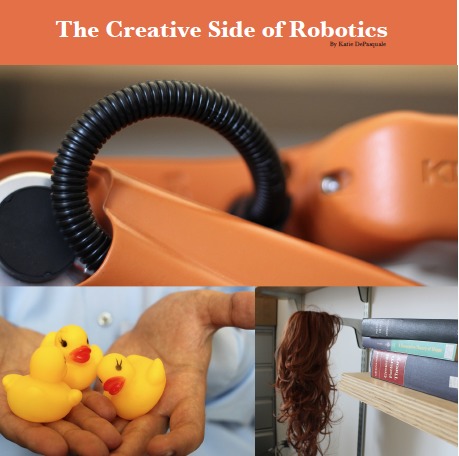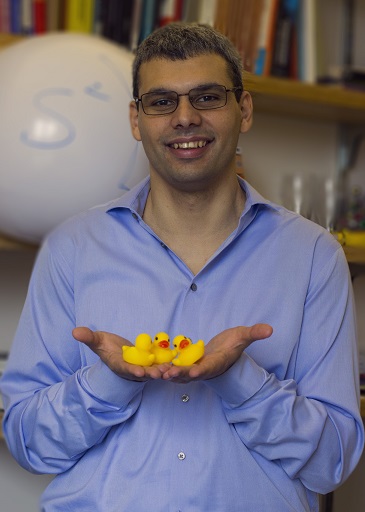

When entering Andrea Censi.s office at LIDS, the first thing you see is evidence of his experimental work: more than a few computers, a couple of mobile robots, a quadcopter on a shelf, and a robotic manipulator in the corner.
Then you spy the slightly more unusual white beach ball, which Andrea refers to as a "spherical whiteboard" and uses to teach differential geometry. By the time you notice the presence of a few dozen yellow rubber ducks, a fancy microphone, and a redheaded wig, it's clear that not only are you in the presence of a creative thinker, but it's also going to be quite a story finding out how all of this is related to Andrea's research.
Coming to LIDS in 2013 after getting his PhD in Control and Dynamical Systems (CDS) from Caltech (their equivalent of LIDS), Andrea is a research scientist who knows and respects the history and seriousness of control engineering. But as his office dér suggests, he wants to keep things lively and welcoming. He doesn't believe that "serious" must imply "austere", which is why you'll find jokes in his papers and why he's always happy to organize the occasional friendly prank on his fellow scientists.
Andrea grew up in Rome, Italy, in a household headed by two scientists. His mother is a nuclear physicist and his father a control engineer. Although getting a PhD in Control and Dynamical Systems could be seen as inevitable, Andrea arrived there through a circuitous route that started with artificial intelligence and evolved into a more specific focus on the control aspects of robotics. These days, Andrea advocates a modern take on control that involves working with realistic complex systems, dealing with high-dimensional data and large-scale computation, and creating "cloud-enabled" robots. While the technical tools he employs are unusual for the field, Andrea sees his work as continuing the tradition of cybernetics in the original spirit of Norbert Wiener, the MIT professor who founded the field in the 1940s.
One area of robotics that Andrea is passionate about, and about which he wrote his dissertation, is the problem of learning for robots that.s known as "bootstrapping". Can an agent embodied in an unknown body learn from sensorimotor data all the models needed for its operation? Andrea thinks so, citing the brain as an example of a system that can learn to use any sensor or actuator.
Upon arriving at LIDS, he started collaborating with Emilio Frazzoli, a professor of Aeronautics and Astronautics, on the use of event-based neuromorphic vision sensors. The output of these sensors is not periodic frames, but rather a series of asynchronous events that mimic the neuron.s spikes-based communication. Together they believe that this new technology is the key enabler for creating very agile, autonomous flying vehicles; and in a way, this conclusion brings Andrea full circle to an early inspiration for his work at Caltech, where he analyzed the behavior of the fruit fly, the most agile autonomous "vehicle" known to man.
As he continues his research, Andrea is cultivating his artistic side, as well, with his most recently acquired hobby: video editing. An early bit of performance art, posted on his website, shows a time-lapse video of him typing and drinking espressos, racing against the clock to finally submit his paper ten minutes before a conference deadline as Beck sings in the background. However, as with those unusual objects in his office, there is a more purposeful side to his video editing. It is becoming a professional service. Andrea proposed and led the creation of a video "trailer" for the 2015 International Conference on Robotics and Automation (ICRA), held in May 2015 in Seattle, Washington. The trailer shows conference highlights, but it's not just an excuse to create more "easily consumable media", as Andrea puts it. Rather, the goal is to lead the public conversation about robots, their place in our lives, and possibilities for the future. He says, "If I ask you about a robot video, probably you've seen Google's autonomous cars, but that is a video likely made by a PR department. This trailer is done by the scientific community, so it is our version of the story."
Telling his version of the story with his philosophy is important to Andrea. So is inspiring his colleagues by whatever means he can imagine, which is how we return, first, to those yellow rubber ducks. For next year's ICRA conference, he's arranging for a thousand of them in identical sizes to be delivered to the facilities for his roboticist colleagues to take home. Later, they can each submit clips for his new trailer, provided their clips all contain one of the official ducks. Of course, the ducks have nothing whatsoever to do with robots, but Andrea is betting that establishing an arbitrary duck constraint will make the submissions more creative. The several dozen rubber ducks currently in his office are there so he can evaluate the different models available. The fancy microphone is also related to the trailer, which was translated into eight languages. On very short notice, Andrea had to find and record versions of the text in Arabic, Korean, Spanish, and Italian. Fortunately, with the help of LIDS.s international community, he was able to gather a narrator for each language.
As for that final object, the redheaded wig, that is evidence of Andrea's passion for pranks. When MIT Mechanical Engineering Professor and Irishman John Leonard was scheduled to give the LIDS Seminar on St. Patrick's Day, Andrea arranged to have him served a pint of Guinness instead of the customary bottle of water. The improvised "Irish waitress" for the event, John.s post-doc Liam Paull, exceeded expectations by wearing that wig.
Goofy props and costumes notwithstanding, these activities demonstrate Andrea.s belief in the importance of people getting together, getting along, and having fun while they learn. As he says, "In the end, it's not about making jokes, it's about having an environment where creativity flourishes. Having a relaxed atmosphere helps students to be more creative, and also to have the feeling that everybody's more accessible if they need help."
Andrea likes to post to the LIDS mailing lists with thoughts about the discipline and bits of poetry about nonlinear systems. He has organized events such as the Faculty Applicants Support Group last winter, where students and post-docs shared their apprehension about the faculty application process, and is assisting in organizing the LIDS Tea with Asu Ozdaglar, Director of LIDS, which is meant to facilitate a more relaxed interaction among faculty, students, and postdocs. In the summer, he plans to take LIDS students on a series of .school trips. to robotics companies in and around Boston. He wants everyone who enters his office to take to heart the sign outside his door, which reads, "You are welcome here." It doesn't matter whether it's to talk about neuromorphic sensors or to share a laugh.
